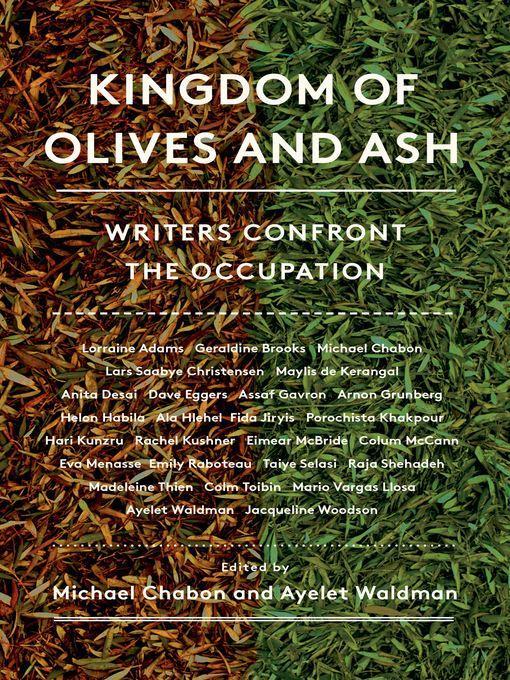
Kingdom of Olives and Ash
Writers Confront the Occupation
کتاب های مرتبط
- اطلاعات
- نقد و بررسی
- دیدگاه کاربران
نقد و بررسی

February 13, 2017
Authors Waldman and Chabon, together with the Israeli NGO Breaking the Silence, a group of former soldiers who served in the West Bank and Gaza, have compiled a hefty volume of essays about life in the Israeli-occupied Palestinian territories. The results vary, but the message is unwavering: life under occupation is frightening and oppressive. Strong efforts include Geraldine Brooks’s opening piece, about two Palestinian children caught up in cyclical violence. Rachel Kushner draws out the unsavory subject of Palestinian-on-Palestinian violence. Chabon himself addresses the curbs placed on Palestinian commerce and how this also redefines the Palestinian experience of “normal life.” But other writers see the occupation through self-involved lenses, and Waldman, in her wrenching account of detained children and their training in nonviolent resistance, seems to only belatedly realize that the attention she gives her sources adds to their troubles. Because of the limits of the NGO’s network, the same anti-occupation activists repeat their roles as informants and show up in multiple essays, reinforcing the situation’s grinding hopelessness. Hannah Barag, an Israeli octogenarian and checkpoint monitor, is a rare voice of prediction amid the general feeling of stasis: “I think the system is going to collapse.” Agent: Mary Evans, Mary Evans Inc.

Starred review from March 15, 2017
On the 50th anniversary of Israeli occupation of Palestine, top writers bear witness to oppression and despair.When Waldman (A Really Good Day: How Microdosing Made a Mega Difference in My Mood, My Marriage, and My Life, 2017, etc.) visited Israel for the Jerusalem International Writers Festival in 2014, she met members of the nonprofit groups Breaking the Silence and Youth Against Settlements, who helped her to understand -the massive, often brutal, always dehumanizing military bureaucracy- that defines the occupation. Hoping to focus attention on the desperate situation, she and her husband, Pulitzer Prize-winning novelist Chabon (Moonglow, 2016, etc.), invited an international roster of writers to tour towns and villages in the Israeli-occupied territories and meet with community organizers, workers, artists, activists, farmers, and families, as well as Israeli settlers and disillusioned soldiers. Their responses to those visits are moving, heartbreaking, and infuriating, testifying to the chilling cruelty of Israel's policy toward Palestinians. Even Palestinians given Israeli citizenship are vulnerable to -demographic transfer---or -forced displacement- in order -to achieve the 'purity' of 'the Jewish state, ' - writes Palestinian-born, British-educated Fida Jiryis. -One can only wonder at the sadistic ingenuity with which Israel has woven an airtight system around us to suffocate every aspect of our lives.- Walls are a recurrent image: they keep Palestinians in their crumbling towns and separate farmers from their land, workers from their jobs, and family members from one another. Gaza, writes Dave Eggers, -is a prison- with a 40-mile, 25-foot wall on its northern border with Israel and the heavily patrolled Mediterranean on the west. Checkpoints require elaborate documentation, which takes countless hours to assemble. As Chabon notes, -control of time is one of the biggest weapons of the occupation.- Young soldiers wield deadly power capriciously; houses are evacuated and razed in the middle of the night; a refugee camp has -no infrastructure of any kind.- Among the most well-known contributors are Geraldine Brooks, Mario Vargas Llosa, Colum McCann, and Jacqueline Woodson; royalties will go to NGOs. Deeply unsettling, important stories call for urgent responses to the Middle East conflict.
COPYRIGHT(2017) Kirkus Reviews, ALL RIGHTS RESERVED.

Starred review from May 15, 2017
Chabon (Moonglow, 2016) and Waldman (A Really Good Day, 2017), husband and wife, both Jewish, candidly state in their introduction to this resounding essay collection that they were reluctant to even think about Israel and Palestine until a writers' festival brought Jerusalem-born Waldman back to her birthplace. With the occupation reaching its 50-year mark in June 2017, and as illegal settlements spread, isolating millions of Palestinians in overcrowded, financially choked enclaves, she and Chabon joined forces with two nonprofit groups (which will receive the book's proceeds)Youth Against Settlements (Waldman profiles founder Issa Amro) and Breaking the Silence, established by former Israeli soldiersto bring two dozen exceptional writers to the occupied territories, including Hari Kunzru, Madeleine Thien, Colm Toibin, Mario Vargas Llosa, and Jacqueline Woodson. Their dramatic testimonies are radiant with telling details, vital portraits, and explosive facts. Geraldine Brooks tells the crushing story of two young Palestinian cousins. Dave Eggers meets courageous artists in Gaza, a dehumanizing open-air prison. Assaf Gavron tells harrowing tales of Palestinian soccer players; Porochista Khakpour meets rappers. The soul-crushing bureaucracy of the occupation is exposed in Raja Shehadeh's narrative about a Palestinian taxi driver and in Chabon's tale of a businessman. This sensitive, galvanizing, and landmark gathering brings the occupation into sharp focus as a tragedy of fear and tyranny, a monumental failure of compassion and justice, a horrific obstacle to world peace.(Reprinted with permission of Booklist, copyright 2017, American Library Association.)

January 1, 2017
For this anthology, published to coincide with the 50th anniversary of the Israeli occupation of the West Bank, esteemed novelists Chabon and Waldman join with the Israeli NGO Breaking the Silence--an organization of former Israeli soldiers who served in the occupied territories--to present voices about a deeply contentious issue. With a 40,000-copy first printing.
Copyright 2017 Library Journal, LLC Used with permission.

























دیدگاه کاربران